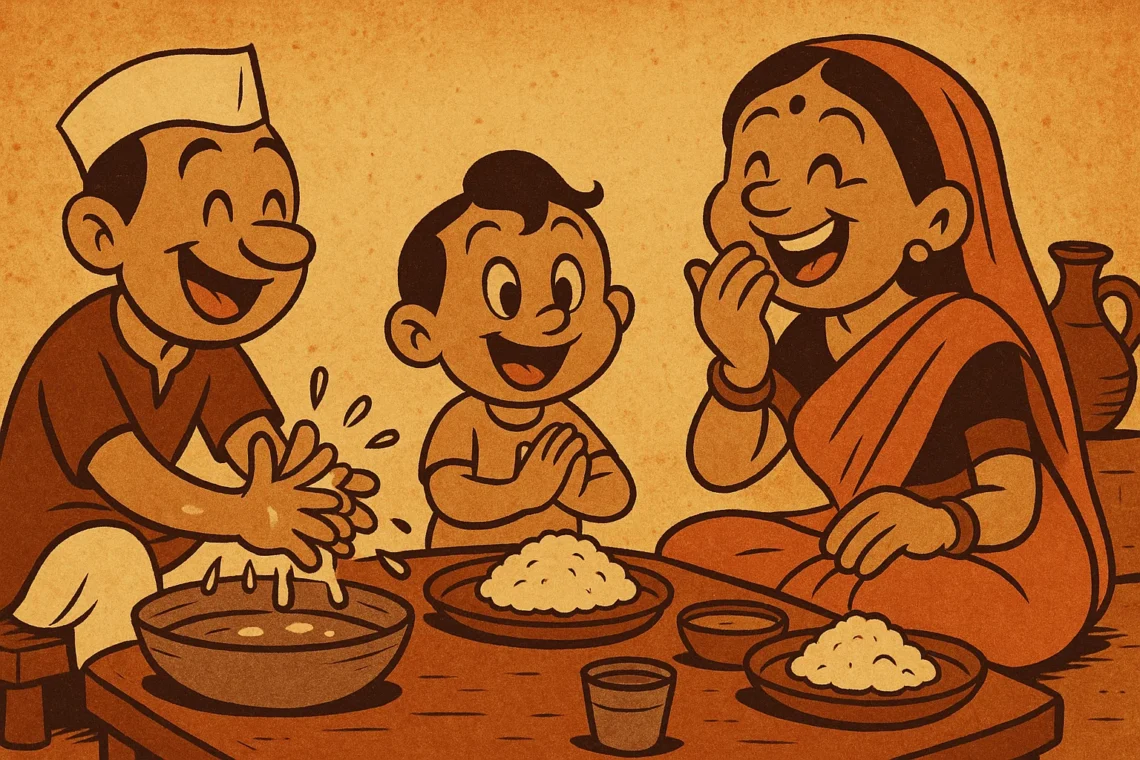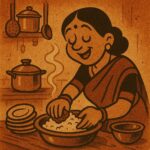In every Indian household, there’s a simple rule that precedes every meal. It’s not about the table setting. It’s not about saying grace. It’s not even about waiting for the eldest to take the first bite. It’s this: go wash your hands. No exceptions. No negotiations. Doesn’t matter if you claim they’re “not dirty.” Doesn’t matter if you say, “I just washed them five minutes ago.” If you’re about to eat, you wash. Period.
And it’s not a polite, perfunctory rinse either. It’s a full-blown ritual. You walk to the basin, roll up your sleeves, splash cold water, rub both sides of your hands like you’re prepping for surgery, sometimes even cup the water to wash your mouth if you’re feeling extra traditional. You return with dripping fingers, wiping them on the towel that’s been hanging by the kitchen door since the early 2000s and smells faintly of turmeric and time. Now—and only now—you may eat.
It’s Not Just Cleanliness. It’s Culture.
Sure, there’s hygiene involved. You’re using your hands to eat, after all. And not just for picking up pieces of food—your fingers become spoons, forks, ladles. They mix the dal with rice. They scoop up the sabzi. They fold rotis, mop up gravies, and guide every bite toward the mouth with a precision that no cutlery can match. To do that with unwashed hands? Unthinkable. Blasphemous, even.
But more than germs, it’s about grounding. About presence. Washing your hands signals to the body—and the brain—that it’s time to switch gears. From doing to receiving. From rushing to resting. From outside chaos to inside comfort. It’s a small act, but it prepares you to respect the food that’s about to be eaten. Because in Indian culture, food is never casual. It’s sacred. And you don’t walk into a sacred space unprepared.
Every Meal Starts with the Basin
In old-style homes, there was always a handwashing station just outside the kitchen. Sometimes it was just a big brass lota and a soap cake on a dish. Sometimes it was an actual stone basin, worn smooth by decades of repetition. In newer homes, it’s the utility sink, or the bathroom tap. But the location never mattered. The ritual did.
I remember my grandmother would glare at anyone who even looked at the food before washing up. “Do you walk into the mandir with chappals on?” she’d ask. That was the logic. You purify the body before feeding the soul. Even now, at restaurants or weddings, I find myself glancing around for a basin before I can enjoy the buffet. It’s muscle memory. Deeply embedded etiquette.
The Hand as a Tool, Not a Taboo
In India, eating with hands is not just normal—it’s preferred. It’s believed to stimulate digestion, activate enzymes, and connect you more fully to the meal. There’s a sensory intimacy to it—the feel of warm rice, the weight of roti, the texture of sabzi. And when your hand becomes that intimate with food, it better be clean.
This is why even toddlers are taught this early. Before they can form full sentences, they know: food is not touched until your hands are washed. Parents enforce it not with scolding, but with quiet repetition. And somewhere along the line, it stops being a rule and becomes a rhythm.
More Than Manners, It’s Mindfulness
In our rush to modernize meals—TV dinners, takeout containers, disposable cutlery—we often forget the rituals that made eating feel complete. Washing hands before a meal isn’t just an old habit. It’s a pause. A breath. A reset button. It marks a transition. And in a culture where meals are family time, memory time, and often therapy time, that moment of pause becomes precious.
It’s a reminder that food isn’t just fuel. It’s offering. It’s labor. It’s love, folded into rotis, stirred into dal, spooned into katoris. And when something is offered with care, you receive it with clean hands.
The Scent of Soap and Hot Roti
Even today, when I walk into my mother’s kitchen and smell that first puff of ghee hitting the tawa, she doesn’t say “hello” or “are you hungry?” She says, “Go wash your hands.” And I do. Without question. Because some traditions are too deeply ingrained to ignore. And honestly? The roti tastes better after.
Because that simple act—wet palms, wiped fingers—isn’t just about removing dirt. It’s about arriving. About making space for food, and for the moment. It’s about showing up—clean, present, ready. And that’s why no one eats without washing their hands.
Born in Mumbai, now stir-frying feelings in Texas. Writes about food, memory, and the messy magic in between — mostly to stay hungry, sometimes just to stay sane.












